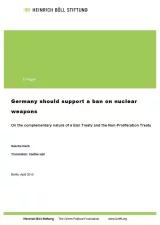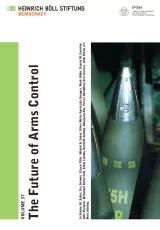Unfortunately, no significant progress has been made with regards to Indonesian endorsement to the Austrian Pledge by the time the 2015 NPT Review Conference takes place. The attitude of the government remains a serious challenge for the civil society.

Indonesia has been a strong supporter of the nuclear disarmament and has been actively engaged in various mechanisms and initiatives related to disarmament. Indonesia is a state party to the NPT. For many years Indonesia was the coordinator of the Non Aligned Movement (NAM) Working Group on Disarmament.
Under the leadership of Indonesia, NAM initiated in 2013 the adoption of 26 September as the International Day for the Total Elimination of Nuclear Weapons. In addition, along with its fellow Southeast Asian countries, Indonesia adopted a nuclear weapons moratorium treaty under auspices of ASEAN in 1995. Known as Southeast Asian Nuclear Weapons Free Zone (SEANFWZ) the treaty obliges its members not to develop, manufacture or otherwise acquire, possess or have control over nuclear weapons.
Indonesia has also been very supportive of the humanitarian initiative. It was among the 16 countries (Group of 16) which delivered a joint statement at the 2012 NPT Preparatory Committee following the reference of the humanitarian consequences of nuclear weapons at the 2010 NPT Review Conference. Indonesia participated in all three Conferences on the Humanitarian Impacts of Nuclear Weapons took place in Oslo, Nayarit and Vienna. Indonesia is not, however, ready for endorsing the Austrian Pledge.
Some factors seem to prevent Indonesian from endorsing the Austrian Pledge. For Indonesian government any initiative on nuclear disarmament must be made under the framework of existing mechanisms such as NPT and Conference on Disarmament. In its view, a new initiative in the form of banning nuclear weapons through a legally binding treaty will not be effective unless it is supported by all countries. The fact that the nuclear weapons states are not supporting the treaty banning nuclear weapons would be a serious challenge in the eyes of Indonesia which makes it simply unworkable. In addition, Jakarta fears that the initiative leading to a legally binding treaty banning nuclear weapons will split the countries into two opposite positions which lead to ineffectiveness.
No significant progress has been made with regards to Indonesian endorsement to the Austrian Pledge by the time the 2015 NPT Review Conference takes place. But, the Indonesian government has been insisting that it remained committed to its position on nuclear disarmament and to support the humanitarian initiative.
This insistence is reflected in the statements that the Indonesian delegation has made in the NPT Review Conference. Moreover, without mentioning the Austrian Pledge, Indonesian government is ready to make statement in the 2015 NPT Review Conference to include the need of the state parties to the NPT to fill the legal gap in the nuclear disarmament.
Indonesian attitude toward the Austrian Pledge reflects a serious challenge for the civil society in Indonesia. A lot more efforts have to be done to convince Indonesian government for the significance of the Austrian Pledge to the nuclear disarmament, a position that Indonesia has been supporting for long. No doubt, this is not an easy task. But, the experience built through an intensive learning process during the 2015 NPT Review Conference and the continuous support of the network will make the task more bearable.
This article is part of our German dossier on the five-yearly Review Conference of the Nuclear Non-Proliferation Treaty, whick takes place from April 27 to May 22, 2015 in New York.

